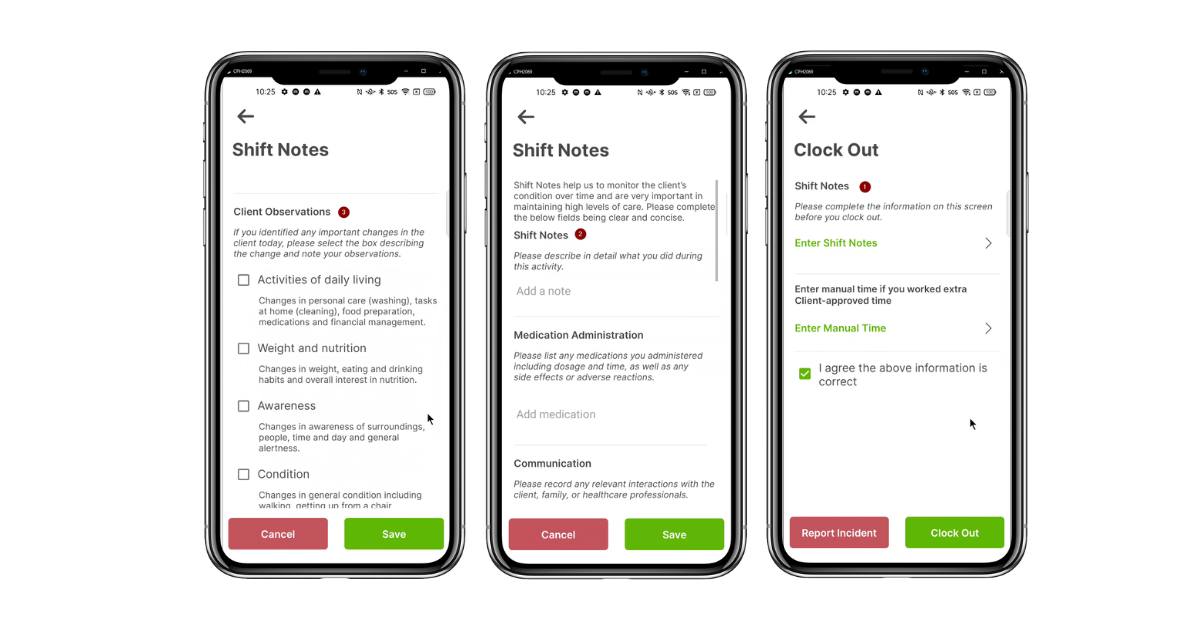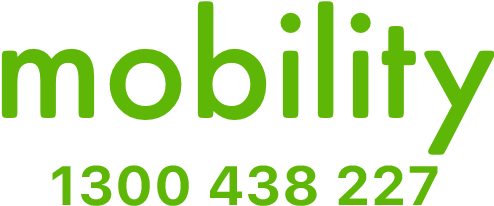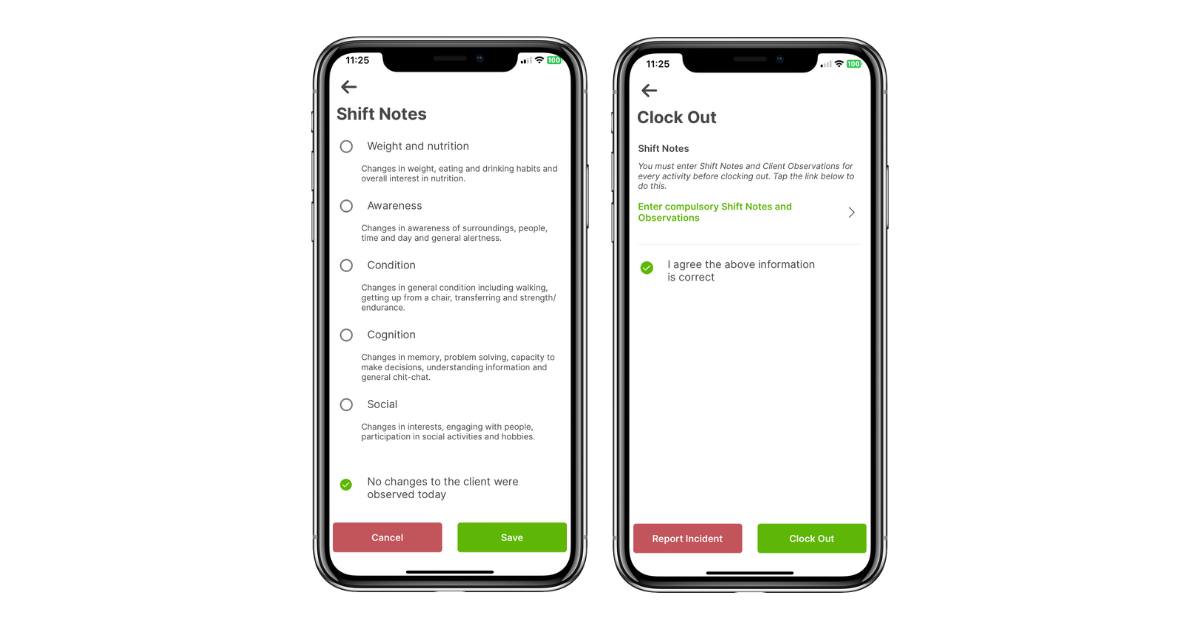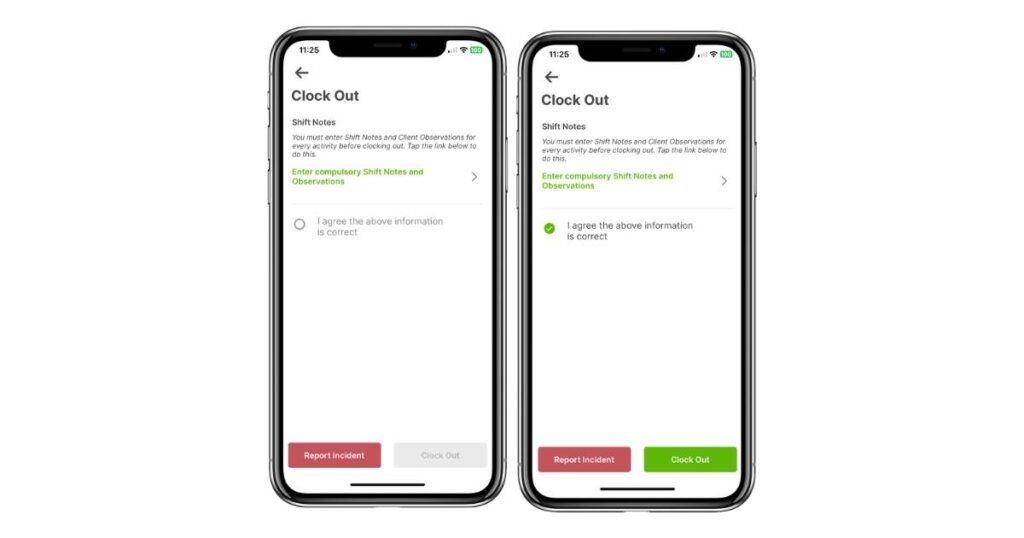Why Are Shift Notes Important?
When you finish a homecare or community care job, you must complete shift notes. These notes help us catch any signs of change in our client’s health. Even small changes can be significant, helping us act quickly to support our clients better.
What is AWACCS?
AWACCS stands for Activities of daily living, Weight and Nutrition, Awareness, Condition, Cognition, and Social. It’s a framework designed to help our workers observe and report any changes in these key areas that could indicate a change in a client’s health status.
Who Needs to Complete Shift Notes?
When you finish a homecare or community care job, you’ll be asked to complete shift notes upon clocking out. These notes are for documenting any changes you’ve noticed in the client during your service.

How to Complete AWACCS Shift Notes:
Activities of Daily Living (A)
- Report if the client shows reluctance to bathe, changes in routine tasks, or differences in managing personal care, home tasks, food prep, medications, or finances.
Weight and Nutrition (W)
- Note any noticeable weight loss or gain, changes in clothing fit, eating habits, or interest in food and drink.
Awareness (A)
- Observe and record the client’s awareness of their surroundings, people, time, and day.
Condition (C)
- Detail any new or worsening symptoms, such as heart sensations, headaches, changes in temperature, or mobility.
Cognition (C)
- Document changes in sleep patterns, confusion, memory issues, problem-solving abilities, decision-making, or understanding.
Social (S)
- Note changes in social interaction, desire for company, hobbies, and overall engagement with others.
No Changes to Report?
If there are no changes to report, simply select the “No changes to the client were observed today” option. However, if you observe anything that might indicate a decline or significant change in the client’s condition, please provide detailed notes.
Sharing Your Shift Notes:
Your AWACCS shift notes are shared with mobility’s Head of Care and the client’s clinical or care manager for review. These notes focus solely on monitoring the client’s condition, not your activities, unless they indicate a potential negative change.
Incident Reporting:
If an incident occurs during your shift, you must file an incident report separately. See Reporting an Incident for guidance.
Shift Notes FAQs
The AWACCS shift notes fields help us catch any changes in the client's condition early. Complete all that apply; if there are no changes, just select "No changes to the client observed were observed today".
Share specific observations related to each category in AWACCS. Look for changes in daily activities, weight, awareness, physical conditions, cognitive functions, and social behaviours. Refer to How to Complete AWACCS Shift Notes
Your detailed shift notes enable early intervention if a client's health status changes. Ensuring they receive the care they need promptly.
Yes, if an incident occurs, you should report it separately through our incident reporting system, even if you've completed shift notes. Refer to Reporting an Incident for further guidance.
Yes, continue to complete shift notes for general observations. Incident reports are for specific events requiring immediate attention.
No, for RAC facilities, use the facility's system or report any changes to the clients directly to the facility's care manager. While Shift Notes aren't applicable to this shft type, any incidents that occur are still required to be lodged, see Reporting an Incident for further guidance.
Shift notes track routine observations about a client's condition. Incident reports are used for specific or urgent issues that need attention. Refer to our guides:
Shift notes are reviewed by mobility's Head of Care and the client's clinical team or care manager, helping them monitor the client's health and adjust care plans accordingly.








